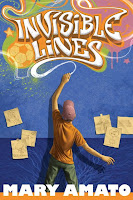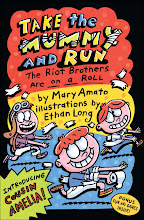Sunday, December 20, 2009
Thursday, November 19, 2009
Writing Tip # 18: New 3-minute Video on the Writing Process
Thursday, October 29, 2009
Question About The Power of Story

Kids write the best fan letters. “It made me feel verry alive.” That’s how a fourth grader from Middletown Elementary School described the experience of reading. From time to time I find the same comment, though not always spelled the same way, in my fan mail, and it always makes me stop and marvel about the power of story. Why does reading a story about someone else make us feel alive? Want to explain your theory?
Illustration by Eric Brace for Please Write in This Book by Mary Amato
Thursday, October 8, 2009
Writing Tip#17: Plotting Your Way
 I often use index cards to keep track of my plot. I try to write short statements related to the action of the story on cards. Sometimes I spread them on the floor to "see" my plot. Sometimes I tape them to a display board.
I often use index cards to keep track of my plot. I try to write short statements related to the action of the story on cards. Sometimes I spread them on the floor to "see" my plot. Sometimes I tape them to a display board. Thursday, September 24, 2009
Creative Teaching Idea #1: Toy Travel Diary

Learn a little something by sending your toy pet into the world...
My name is Inch, and I’m from Wilmette, Illinois. Recently, I traveled to Maryland to visit author Mary Amato (you can see me on the bottom of her rather messy desk holding her pencil). She was surprised to see me and read the tag attached to me. My card asked her to send a note, photo, or postcard to the school about what it’s like where she lives (her geography, culture, climate, population, interesting facts, etc.). Then she is supposed to pass me on to someone else. I’m hoping to travel all around the country. Maybe even the world. Cool, hunh? Thanks to 5th grade teacher Teresa Dobson at Highcrest Middle School for inspiring her students to follow through with such a great idea.
Do you have a creative teaching idea to share?
Friday, September 11, 2009
Writing Tip #16 Kids Deserve Rich Vocabulary
I shoot for the best word, no matter how small or large.
I believe that there is an organic process of learning language, which is called exposure. How do we learn “big” words? By hearing or seeing them used in context. I still recall the thrill of learning the word “salutations” when reading Charlotte’s Web. Imagine if E.B. White had deprived me of that thrill?
Kids are remarkable creatures and can handle just about anything.
While walking to the outdoor pool last week, I passed two boys, about seven years old, sitting on a fence, legs dangling. One boy’s flip-flop sandal fell off his foot, and he turned to his friend and said, in absolute deadpan, “I just lost my dignity.”
Thursday, August 13, 2009
Writing Tip #15: Listen to Leonard Cohen's Advice
Spend a full day writing, painstakingly layering in word after word, only to discover that it all needs to go into the trash at the end of the day. The process is agonizing and depressing and…essential.
How do you keep doing it day after day? By accepting the fact that you have to write in order to write. (I'm still working on this.) The great songwriter Leonard Cohen, captured in a documentary by Lian Lunson, said it this way: “You have to write down what you have to abandon. You’ve got to see how it works with the whole thing and then throw it away.”
Monday, August 3, 2009
Question about Writing in School

Why don't our schools embrace creative writing more consistently?
Last week, at the suggestion of a mom, I offered a three-day creative writing workshop for middle schoolers. The seven kids who came to my studio with notebooks and pencils were on fire. The quality of the writing and critiquing was thrilling.
After the class, a mom told me what I feared: During her daughter’s sixth gradeyear there was only one opportunity to write a short story. Why? Is it because it's hard to "grade" creative writing? Is it because making people laugh or cry through your writing isn't on a standardized test? What do you think? And what kind of support can I, as a writer, offer to teachers out there who want to do more? Any ideas?
Tuesday, June 23, 2009
Writing Tip #14: Letting Go to Let Voice Flow
If you were a "good student" in school, you may sometimes find your creating writing strangled by the long-ingrained impulse to write correctly. Sometimes I forget to allow my characters to stumble, to speak in fragments, to say what comes out. Speech, thankfully, is not robotic and grammatically perfect; it’s sometimes rushed, sometimes painful, often quirky or unconventional. Author M.T. Anderson is a master of capturing authentic voice. Am I legally allowed to pull a quote from one of his books and post it as an example? I don’t know. Every time I read him, I'm reminded how much I need to let go.
Sunday, June 14, 2009
Writing Tip #13: The Essential Wiring

Identify your climax (the ultimate showdown between your protagonist and antagonist). Think of it as the moment when all the lights and sounds go off. Basically, you want all the wires to be connected in such a way as to enable the climax to work. You don’t want any broken circuits. You also don’t want lots of unnecessary wires tangling up the scene. Follow each element of your story back from the climax to the beginning as if you’re tracing the wires. Take a good hard look at anything that doesn’t connect to your climax. Either get rid of it or re-engineer it so that it adds more power.
Wednesday, May 13, 2009
Writing Tip #12: Maintain a Flexible Imagination
Whenever I’m inching my aching and tight muscles into my yoga routine, I’m reminded how difficult and crucial it is to maintain flexibility. Flexibility of the imagination is difficult and crucial, as well. Somehow you have to allow yourself to consider all the options that you never allowed yourself to consider.
Monday, May 4, 2009
Writing Tip #11: What Rhymes with Pomegranate?
I like to consult my rhyming dictionary when songwriting to make sure that I haven’t overlooked any gems or to get out-of-the-box ideas and was encouraged to keep doing this in a songwriting workshop I took with Pat Pattison (Berklee School of Music). Pattison said that his beginning students mistakenly assume that using a writer’s tool, such as a dictionary, is cheating; but relying only on the rhymes that are in the alphabet of your own brain doesn’t prove anything. He says that your creative talent emerges by choosing the best rhyme possible, so it makes sense to comb through as many rhymes as possible.
David told me that he uses www.rhymezone.com on the web after first tapping his own inner rhyme-maker, which he imagines “to run much like an ice cube maker in a funky old hotel.” Love that image!
Wednesday, April 29, 2009
Writing Tip #10: Writing through the Wrong
My first thought: what a waste of effort, time, and keystrokes! My second (and wiser) thought: what necessary writing! As my playwright friend Richard Washer (www.chartertheatre.org) says, “I gotta keep writing through the wrong to get to the right.”
Tuesday, April 21, 2009
Writing Tip #9: Gift-Wrapped Surprises
Friday, March 27, 2009
Writing for Children Quote from L'Engle

Monday, March 23, 2009
Writing Tip #8: Seeing Opportunities

Friday, March 20, 2009
Writing Tip #7: Entrances and Exits

Friday, March 6, 2009
Writing Tip #6: Listen to Fifth Graders
“I liked that you made the main character, Frankie, so bold and brave. If she was boring, it would make the book boring. By the way the character acts, it can make a story either really interesting or really boring. Since she was so bold, it gave the book action. I hate boring books.”
I think my reader hit on the reason why this book actually made it. Frankie's story begins with an autobiographical detail: she finds a love letter written to her father. The same thing happened to me when I was Frankie's age; however the autobiography ends there. I was timid and kept all my anxieties to myself--not such interesting material for a book. I deliberately gave Frankie the boldness that I didn't have.
Is your character passive or active? Ask yourself: what does the main character actually do in the story? It's an important question to ask.
Thursday, February 26, 2009
Writing Tip #5: Be Open to Serendipity

This happened with my forthcoming book Invisible Lines (Egmont USA, October 2009) in a big way. I was giving up on my novel, and I happened to read Mycelium Running: How Mushrooms Can Help Save the World by Paul Stamets, and the avalanche began.
Thankfully, inspiration comes at unexpected times, from unexpected sources.
Writing Tip #4: Offering a Critique
Tuesday, February 17, 2009
Writing Tip #3: XXX Marks the Spot
It's a funny thing: You really can't be attached to your writing if you want to be a writer.
Sunday, February 15, 2009
Writing Tip #2: A Character with a Sense of Humor Can Lighten a Serious Book

I just finished revising my ninth book, Invisible Lines, which will be out in October 2009. It is a serious book about a 7th grade boy who is one step away from homelessness. My first draft was too depressing for anyone to want to read. I decided to give my main character, Trevor, a sense of humor, and that vein of humor that now runs through the story won over my editor, even though the draft she read had many plot problems. She says she “fell in love” with Trevor.
As soon as I decided that Trevor would take pleasure in being funny, I began to “hear” his voice more distinctly. Here it is in Chapter One: “If there’s one thing I’m good at it’s making my mom laugh because when I’m standing up I’m what you call a Stand-up Comedian and when I’m sitting down, I’m just plain funny.”
I often tell my students if they are struggling with a story that is dark, make sure to look for the light. Often simply giving one of your major characters a love of being playful or funny can be just what the story needs.
Friday, February 13, 2009
Writing Tip #1: Carry a Writer's Notebook



